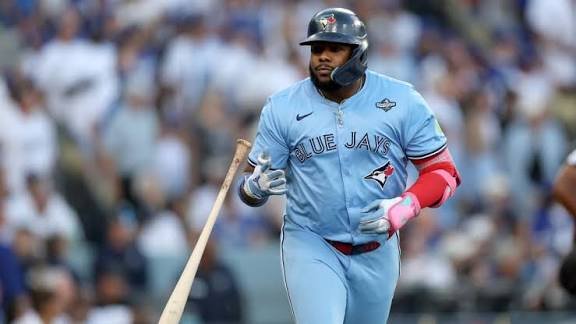
Introduction

When you hear the name Vladimir Guerrero (often “Vlad” to fans), you immediately think of bat-speed, power, and a Dominican icon of baseball. But two questions often come up that are less about his stats and more about symbolism:
-
Why is his given name Vladimir — a Slavic-sounding name for a Dominican star?
-
What is that ritual his son (and sometimes he himself) does — writing something in the dirt near home plate before an at-bat?
In this article we’ll explore both: the origin and meaning of the name Vladimir, how it came to be in this case, and also the deeper significance behind writing in the dirt — what it means, where it started, and how it embodies faith, identity, and family.
Why is he named “Vladimir”?
A. The meaning of the name
The given name Vladimir has Slavic origins. According to etymological sources:
-
It is derived from the Old East Slavic Volodiměrъ or the Old Church Slavonic Vladiměr.
-
One typical breakdown: vlad- meaning “to rule / ruler” and -mir meaning “peace” or “world.” So the folk etymologies render meanings like “ruler of the world”, “peaceful ruler”, “great ruler”.
-
More modern baby-name sites verify it: for example, Nameberry lists Vladimir as meaning “great ruler, peaceful ruler, ruler of the world.”
In short: Vladimir = “ruler” (in some sense) + “great / peace / world.”
B. How did it end up in a Dominican-Republic context?
You might wonder: why a Dominican player would have a name so deeply Slavic in its origin. The article “The Quiet Warrior” in Sports Illustrated touches on this: when his mother was asked about the name, she said:
“My children’s names are all from the Bible, or of saints …”
And then the article continued, referencing how “Vladimir the Great, prince of Kiev (956-1015)” is a historical figure with that name, and the combination “Vladimir Guerrero” is interesting given his Dominican roots.
In other words:
-
While the name Vladimir is not typically Hispanic/Latino in origin, in Latin America there’s a history of naming children with “exotic” or foreign-sounding names, often without a direct cultural link to those origins. (One discussion thread points out Spanish-speakers having Russian first-names. )
-
For Guerrero’s family, his mother explained that the children were raised Christian and named accordingly; Vladimir was simply the name chosen.
Thus, while the name is unusual for a Dominican athlete, it doesn’t appear to carry direct Slavic lineage; rather it reflects naming preferences of the era and family.
C. Why the “Guerrero” surname fits: meaning & identity
Interestingly, his last name — Guerrero — is Spanish for “warrior”. So “Vladimir Guerrero” roughly translates to “ruler/peaceful-ruler warrior” if you combine the etymologies loosely. While not intentional at a semantic level, it is a neat coincidence: a powerful name (“Vladimir”) + the literal “warrior” surname. In many ways, his presence on the field matched the name: a warrior at the plate, a ruler of the bat, etc.
What does he write in the dirt?
A. The ritual: what happens before the at-bat
The ritual we’re addressing is more often associated with his son, Vladimir Guerrero Jr. (Vlad Jr.). But understanding it brings insight into the family, faith, and identity.
-
According to Sports Spectrum, every time Guerrero Jr. steps up to the plate, he writes “DIOS” in the dirt — the Spanish word for “God”.
-
A feature on “At the Letters” detailed:
“First, he holds the bat (by) the barrel, and with the handle of the bat, he reaches down and writes ‘Dios’ into the dirt of the home plate circle — ‘God’ in Spanish.”
-
On Reddit and fan forums:
“He writes the word ‘DIOS’ in the dirt. He’s been doing that since his minor league career.”
So the short answer: He writes “DIOS” in the dirt with his bat before beginning his at-bat. Vladimir Guerrero what does write in the dirt.
B. Why does he do this? The meaning behind the gesture
Several layers to this:
-
Faith & gratitude
The act is a visible sign of his Christian faith — giving thanks to God at each plate appearance. As News & Articles note, Guerrero Jr.’s social-media bios reference Bible verses (e.g., Psalm 121).
Writing „DIOS“ symbolizes putting God first — an acknowledgement that whatever happens, he is playing under that higher guiding power. -
Ritual, focus & mental preparation
Before a potentially tense moment (standing in the batter’s box), a short, consistent ritual helps centre the mind. The writing in the dirt becomes a tangible nod to calm, focus, and connection. The “At the Letters” writer described the moment:“Then he takes the bat and he taps the catcher, and he taps the umpire—a show of respect… Then he steps in… he’s as comfortable as can be.”
It’s not merely superstition: it’s a ritual of respect—to key participants, to the moment, and to his faith. -
Family heritage & identity
Given that he carries the Guerrero name (his father is a Hall-of-Fame athlete) and the weight of legacy, the ritual helps ground him in his roots. It subtly reinforces: “I am here, I honour my family, I honour my faith.” The symbolic writing links to his upbringing, his cultural identity, and his sense of purpose.
C. Is the ritual linked to Vladimir Guerrero Sr.?
Interestingly, most sources attribute the ritual explicitly to his son (Vlad Jr.). There is no strong indication that Vladimir Guerrero Sr. engaged in that exact ritual. Guerrero Sr. has his own unique style and quirks (for example his almost fearless hacks and ability to hit bad-balls).
Thus: the “writing in the dirt” is not a hallmark of the senior Guerrero’s routine — but part of the next generation, influenced by faith and family. That said, as father and son, the name and legacy converge.
Putting it all together: Name + Ritual = Legacy
When you combine the meaning of the name Vladimir (ruler, peace, world) with the literal translation of “Guerrero” (warrior) and then consider the ritual of writing “DIOS” (God), you get a fascinating convergence:
-
A man (and a family) who stand in the world of baseball as “rulers” of their craft — strong, iconic, powerful.
-
The surname “Guerrero” emphasizes battle, fight, resistance — apt for a pro slugger.
-
The ritual of “DIOS” anchors them in humility, faith, gratitude — a reminder that beyond the power and the fame, there is something greater.
In many ways, the name and the ritual reflect the full arc of identity: strength + servant-heart, talent + humility.
Why this matters to fans & culture
-
Beyond the numbers: In an era of stats, analytics and metrics, such rituals remind us that sport is human, spiritual, symbolic. The writing in the dirt is a simple moment, but it resonates.
-
Name stories: Many fans ask “Why Vladimir?” — understanding the name’s meaning, and how it fits a Dominican athlete, opens a window into global culture, migration of names, and how identity is formed.
-
Legacy and lineage: With the Guerrero family, the name is passed on, the ritual adopted, the legacy extended — showing how sport, family, faith interconnect.
-
Inspiration: For young athletes, rituals like this can help with mental preparation, grounding, pre-game focus. Seeing a star take a moment of thanksgiving or focus — pre-hit — can humanize the hero. Vladimir Guerrero what does write in the dirt.
FAQs (Frequently Asked Questions)
Q1: Does Vladimir Guerrero Sr. write “DIOS” in the dirt like his son does?
A1: There is no reliable public account that Guerrero Sr. performed that exact ritual. The writing “DIOS” is specifically attributed to his son, Vladimir Guerrero Jr.
Q2: What exactly does “DIOS” mean, and why Spanish?
A2: “Dios” is the Spanish word for “God.” Guerrero Jr., being of Dominican heritage and a Spanish-speaker, uses “DIOS” during pre-at-bat ritual. It’s a visible acknowledgement of his Christian faith.
Q3: Why did the family choose the name “Vladimir” despite being in the Dominican Republic?
A3: According to an interview referenced in Sports Illustrated, his mother explained that their children’s names came from the Bible or saints, and Vladimir was chosen. While the name is Slavic in origin, in this context it was a parental choice rather than a direct linkage to Eastern Europe.
Q4: Is the meaning of the name “Vladimir” relevant to his playing style or persona?
A4: Indirectly yes — the name meaning “ruler”, “great power”, or “peaceful ruler” resonates with his dominating presence on the field: Guerrero Sr. was one of the most feared hitters in his era. So while the name didn’t dictate behavior, the symbolism and public persona align interestingly.
Q5: Are there other “rituals” that the Guerrero family uses in baseball?
A5: Beyond the dirt-writing ritual, much of the public focus is on the game performance and style of play (especially Guerrero Sr.’s ability to hit bad-balls, etc.). However, the ritual of respect (tapping catcher/umpire, writing in dirt) by Guerrero Jr. is relatively unique and documented. Vladimir Guerrero what does write in the dirt.
Conclusion
When we look at Vladimir Guerrero’s name and the ritual of writing in the dirt, we’re seeing more than just quirky baseball tradition. We’re witnessing identity: a global name rooted in “ruler/peace”, a surname that literally means “warrior”, and a ritual that points upward to faith.
The name Vladimir may seem out-of-place for a Dominican athlete at first glance — but once you dig into the meaning, origin, and family choice, it makes sense as a powerful personal identifier. And the act of writing “DIOS” in the dirt before the at-bat? A quiet but profound acknowledgement that for the Guerrero family, success isn’t just about power; it’s about purpose.
